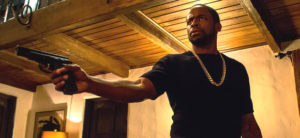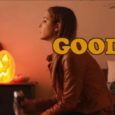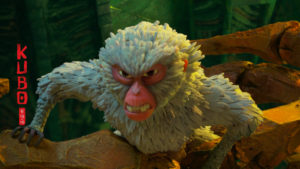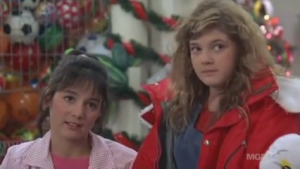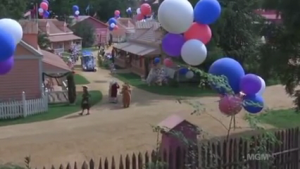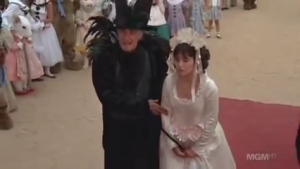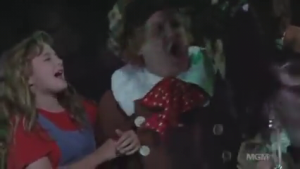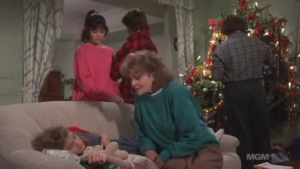Sleight is one of those movies that almost flew completely under my radar. Despite premiering at Sundance in 2016, I hadn’t heard of it until a tweet showed up in my Twitter timeline. I forget its contents now but the retweeter, Dulé Hill of Psych fame, was promoting the film. Which makes sense considering he’s one of its stars. As a fan of Hill, my interest was piqued.
The movie focuses on Bo, relative newcomer Jacob Latimore, a brilliant kid with a penchant for science. He was forced to drop out of school after his mother died to take care of his younger sister, Tina (Storm Reid). During the day, Bo works as a street magician, performing simple card tricks and levitating items for tourists in the busy parts of LA. But at night he hustles drugs for a local kingpin, Angelo (Hill).
For the most part, his life is going well. His bills are paid, his sister is doing well in school. He even meets a girl, Holly (Seychelle Gabriel). But when Angelo asks him for a “favor,” his golden life starts to tarnish, and he sees that the man he’s working for is not the friend he thought he once was.
Directed and co-written by J.D. Dillard, Sleight really delves into the character of Bo, working hard to make sure the audience really understands what he’s going through. Unfortunately, it does this to the detriment of the rest of the cast. We get a small look into Holly’s home life, with lines that quickly explain away why she’s not as happy as she should be. Antagonist Angelo is a trope-fueled gangster; we never learn why he’s as sadistic as he is, but it turns out it’s never important to the plot. All that matters is that he put Bo in a certain position and all we are supposed to care about is how he’s going to get out of it.
Sleight does do something very right, and that’s the aspect of Bo’s “magic.” We see early on that things may not be what they seem and as the film progresses, our suspicions are confirmed. However, we spend so much time wondering just what is happening that by the time everything comes to a head, the finale seems anti-climactic. Everything that the movie worked up to, the final confrontation that I was looking forward to, was over in five minutes, leaving me with a “that’s it?’ feeling.
The film’s marketing is my biggest gripe with Sleight. The movie billed itself as a super hero film (it was referred to as “Chronicle meets Iron Man”) but it never actually feels that way. Sure, it contains a few elements of super heroism, like the source of Bo’s mysterious “powers.” But at its core it’s a character study. It’s a tale of revenge and redemption. We see a smart kid like Bo get stuck in a harrowing situation due to factors outside of his control, forcing him to do something stupid to try and pull himself out, only to get mired deeper into it. Yes, Bo can do some amazing things but that doesn’t make him a super hero and billing him as such denigrates the achievements of his character.
All that aside, Sleight is a beautifully directed film. Dillard uses natural light as often as possible, probably as a way to keep the production budget down but he does so in a way that makes the film more interesting to watch. Even his framing of characters in certain scenes added life to otherwise static moments; talking heads aren’t very interesting but if they’re shot from the right angle, we can be enraptured.
The acting in Sleight deserves a nod as well. Latimore was perfect in the role of Bo, coming off as cocky in his magic scenes but then awkward and unsure when he’s with Angelo or Holly. Seychelle Gabriel was also a joy to watch; Holly’s backstory didn’t lend much depth to the character but Gabriel manages to keep her interesting, mostly through Holly’s rapport with Bo. It’s a shame Holly was only used as a crutch for Bo. I would have liked to have dived deeper into her character.
Dulé Hill was one of the oddest characters to see in this film. As an actor who generally only plays nice guys, like Gus in the aforementioned Psych, seeing him as the tough-as-nails, sadistic drug czar was certainly a change of pace. At times, it even seemed awkward to hear him drop F-bombs and get physical with other characters. Unfortunately, Hill’s portrayal of Angelo felt a little stilted, like he was trying to make the character his own instead of drawing upon inspiration from other badass drug dealers in early cinema. Which is fine, but when every other aspect of the character is derivative of a hundred other films out there, it doesn’t jibe too well. That said, Hill did well with what he was given.
I’m happy that I saw Sleight early in its release and I do give it credit for what it was trying to do. However, having one interesting character in a cast of overused clichés doesn’t make for a very compelling film. Pair that with marketing that doesn’t wholly apply and you have a recipe for a movie that is bound to disappoint some people. Despite all of that, the character of Bo make it an interesting film, one that I would recommend if you have some free time.
Grade: B-
Even before its release, Kubo and the Two Strings was a special movie. Laika Entertainment, who previously delivered films ParaNorman, Coraline, and The Boxtrolls, earned every iota of anticipation. Consistently positive receptions from critics and moviegoers alike act as the evidence. Additionally, those 3 aforementioned projects were nominated for the Best Animated Feature Academy Award in their respective years. Knowing Laika’s visual and storytelling prowess, Kubo logically became a must-see summer 2016 movie for me.
Unlike other kids in his village, Kubo (voiced by Art Parkinson) is a youthful one-eyed street-performing storyteller. He uses magic to manipulate paper into a variety of moving origami shapes while reciting samurai adventures. Before night falls, Kubo journeys back home to care for his ill mother, using his busking money to pay for their nourishment. Kubo yearns for adventure outside of his stories, but accepts the importance of his responsibility to his mother.
One evening, Kubo mistakenly stays out too late, and two supernatural, terrifying-looking sisters (voiced by Rooney Mara) confront him. These sisters work for our main villain, the Moon King (voiced by Ralph Fiennes). The King stakes some sort of claim on Kubo since our protagonist’s birth. Forced out of his village for his own safety, Kubo starts a road trip to collect artifacts that can protect him from the King. Along the way, new friends Monkey (voiced by Charlize Theron) and Beetle (voiced by Matthew McConaughey, for some reason) join our hero in his quest.
Expanding on those characters, Matthew McConaughey gives a voice acting performance to a samurai Beetle. To me, the Texan twang and charm is an odd choice for a samurai of any species. However, I’m more than willing to overlook it considering what works in the movie’s favor. An example is Charlize Theron, who brings much of the picture’s humor with her deadpan delivery as the character Monkey. Furthermore, Kubo, Monkey, and Beetle display strong chemistry throughout, which can be credited to the writing as much as the voice acting.
The writing also pays tribute to Japanese folklore, which is retold in fresh ways here. I’m certainly not educated enough on said folklore to validate what’s true or not, but it’s definitely compelling. Moreover, the writers authored wholly fulfilling character arcs. The Monkey’s true intentions unravel in gratifying ways. The Beetle finds the sense of purpose he’d once lost. Kubo’s quest includes an emotional side dealing with bravery in the face of grief. Tears in your eyes are a near-guarantee as the end-credits roll.
Kubo and the Two Strings shines with not only its completely unique story, but its visuals. Laika and director Travis Knight designed each environment and character so meticulously. Whether an underwater sequence or an ancient samurai temple, it’s all carefully hand-crafted. Laika has an innate ability to convey human emotion using otherwise lifeless objects. The action scenes are no exception. In Kubo, you’ll find some of 2016’s best designed action in a movie, animated or not.
Another commendable aspect of Kubo and the Two Strings is its use of its music. As expected, the melodies contain a Japanese influence, and it’s well-blended. More compelling is the structure of the score. During the epic battle sequences in the 3rd act, the composition’s rise and fall aids in immersing you completely into this movie.
All in all, Kubo and the Two Strings is a near-perfect movie-going experience. The thrills, story, emotional weight, and amazing visuals balance each other effectively, making Kubo a filmic rarity in 2016. Laika continues to make a name for themselves in the world of animation, but they’re still clamoring for bigger audiences. Perhaps the specific animation style or the deeper stories prevent Laika’s movies from becoming box office phenomenons. Nonetheless, in the same year as Finding Dory and Secret Life of Pets, Kubo is not only the best animated cinematic offerings of the year so far, but one of 2016’s best films – period.
Grade: A-
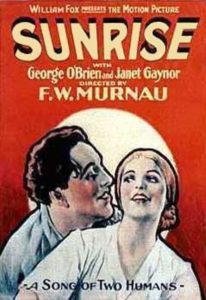 Another silent film from 1927, Sunrise: A Song of Two Humans is directed by F.W. Murnau and starred George O’Brien and Janet Gaynor. It was adapted from the short story “The Excursion to Tilsit” by Carl Mayer and went on to win two of the first Academy Awards, both Best Actress and Best Cinematography. At this point, I’m beginning to think of Janet Gaynor as my 1920s bae.
Another silent film from 1927, Sunrise: A Song of Two Humans is directed by F.W. Murnau and starred George O’Brien and Janet Gaynor. It was adapted from the short story “The Excursion to Tilsit” by Carl Mayer and went on to win two of the first Academy Awards, both Best Actress and Best Cinematography. At this point, I’m beginning to think of Janet Gaynor as my 1920s bae.
Sunrise: A Song of Two Humans
Luckily for me, Sunrise was also available on YouTube which I noticed after it appeared on my “Recommended for you” videos. I was initially worried since I remember reading that the film’s negatives were destroyed in a fire and that it might be one of those “lost” films, but luckily someone was able to make a copy for the masses to enjoy. It was a lazy Sunday afternoon when I began this movie about a sordid affair between a married farmer, The Man, and a floozy, The Woman from the City.
Right away, I was stunned with how hot George O’Brien was- A touch of Ryan Gosling mixed with Chris Evans. His character lacked any sort of spine and had zero concern for his wife, but his trysts with a pretty flapper from the city on vacation were saucy, and it wasn’t long until she pleaded with him to go back with her. While he objects because he has a wife, Margaret Livingston’s lustful city girl demeanor gets dark as she encourages The Man to kill his wife. “Just take her out for a boat ride and throw her over,” she coos at him. The Man’s faces are perfection during this scene, as are the dialogue cards while he struggles with what do. Cue the perfect, delicate flower that is Janet Gaynor as she agrees to a boat ride with the husband she loves dearly while the town’s old maids gossip about how unhappy their marriage is. Surely this is a chance for them to reconnect! Her happiness is beyond infectious as she all but skips to meet her husband for their daylight boat ride, but it’s not long as she realizes something is afoot. The acting is just phenomenal as The Man’s inner struggle comes to a head and he cannot bring himself to toss out his dear wife.
While F.W. Murnau’s sets aren’t particularly laden with details, his direction, especially with the lighting details, adds much to the atmosphere between characters. It’s also worth it to note this is the first time where the camera is in motion during a film, and at times it’s shaky, but a different touch from “7th Heaven.” The moviefone score was perfect. It crescendos at the most romantic of moments between our main characters, and added a blissfully sinister overtone to the early interactions between The Man and The Wife.
While I felt every second of the movie, my favorite scene is where The Man takes The Wife and kisses her good and well. It’s a dizzying, beautiful kiss, as they cause traffic jams, scenery to change, and it’s like the whole span of their love exists in just those few moments. It’s a fucking beautiful piece of film.
Sunrise: A Song of Two Humans was enjoyable, but as the pacing felt slow in places, I’m not sure it’s one I’d watch again. You can definitely find the film on Amazon or at your local video store!
SCreenings is a series of movie diaries from our staff, currently being monopolized for the daunting task of watching every Oscar nominee by one of our editors
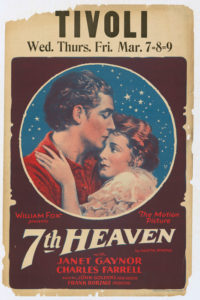 Initially released in 1927 as a silent film based on a play, “7th Heaven” was among the nominees for the first ever Academy Awards for Best Picture. While it didn’t win, it made it’s mark on cinematic history. Starring Janet Gaynor and Charles Farrell, who went on to become America’s Lovebirds, and directed by Frank Borzage, the film did score awards for Best Director, Best Actress, and Best Writing.
Initially released in 1927 as a silent film based on a play, “7th Heaven” was among the nominees for the first ever Academy Awards for Best Picture. While it didn’t win, it made it’s mark on cinematic history. Starring Janet Gaynor and Charles Farrell, who went on to become America’s Lovebirds, and directed by Frank Borzage, the film did score awards for Best Director, Best Actress, and Best Writing.
7th Heaven
I should begin by saying the only silent film I can remember seeing is “Nosferatu,” which renders my expertise in this genre of movie completely nonexistent. I had no idea what to expect from a vintage story at 1:00 AM on a Monday, but as someone who enjoys the experience of a movie, I can say with certainty that there is a certain kind of magic here.
I watched Janet Gaynor’s petite and classically beautiful Diane live a miserable life at the hands of her abusive sister only to be left for dead when the devastatingly handsome Chico, played by Charles Farrell, intervenes. Like seriously, if you had told me I would be lusting for a man who has long since left this world, whose very existence I JUST learned about…well, I’d probably believe you! His tussled hair and strong face probably set many hearts aflame in the twenties! I’m assuming Diane and her bitch sister were “ladies of the evening,” based solely on a couple of vague context clues. Honestly, I’m unsure where they found money to live if they weren’t selling themselves in 1920’s era Paris. Either way, the slow buildup between Diane and Chico was touching, and the ending devastating, demonstrated by the large amounts of tissues I filled with the tears of my ugly sobs. My expectations were low, and to say this movie went above and beyond is an understatement.
Diane’s development from a timid waif to a strong willed person in charge of her own destiny was beautiful, and I found it very interesting that she was the one who inspired Chico to be okay with his feelings, and she was the one providing the backbone to this couple. Gaynor’s range of emotion for Diane is really something to behold. I genuinely can’t wait to see more of her acting. Chico also undergoes a character transformation. His first appearance shows him to be haughty, and proud of his disbelief in “Bon Dieu,” much to the chagrin of the local priest, but with a yearning to be more than a lowly sewer cleaner. It’s only through his relationship with Diane that he sees that there could be more to life than a bitter disregard for everything.
I am pretty sure there are a couple other Frank Borzage directed movies on my list, and if his eye for storytelling remains just as wonderfully paced and framed, I’m really in for a treat. My favorite, favorite scene has to be where Chico leads Diane up seven flights of stairs to his heaven, a rooftop apartment. Borzage’s set allowed the vertical use of a camera in order to shoot the ascension of the stairways in one take and it made such an impression on me. It was romance at its finest as Chico shows Diane the view, delivering an iconic line:
“I work in a sewer but I live near the stars.”
I would absolutely watch this movie again, if just to dream about star crossed lovers. I found the movie on YouTube, but it’s also available on DVD, unless you wanna spring for an expensive ass box set with a bunch of 1920’s films on it!
SCreenings is a series of movie diaries from our staff, currently being monopolized for the daunting task of watching every Oscar nominee by one of our editors




